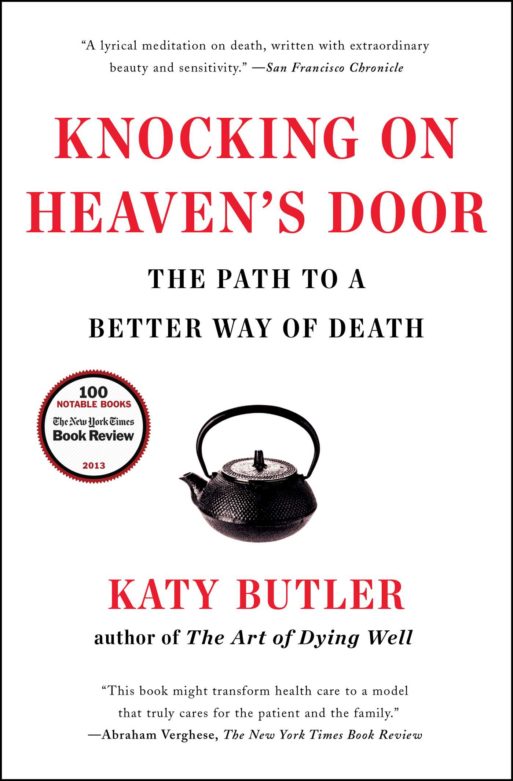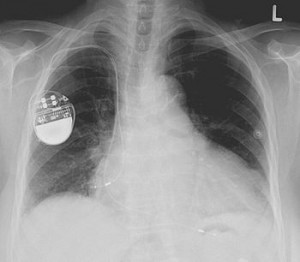 What happens after a debilitating stroke or a sudden heart attack snatches away the vitality of an elderly parent, spouse, or friend? How can we make the transition from child to caregiver or from spouse to nurse? What questions should we ask? How can we decide what is best for our loved ones when we are wrought with stress and anxiety as we watch the competence of our loved one slowly evaporate? Partially a memoir and partially an exposé on the rampant over-treatment of near death patients in the American medical system, Katy Butler’s “Knocking on Heaven’s Door” strives to answer these questions and more as she relays her experience of ushering her father and her mother to the end of their lives.
What happens after a debilitating stroke or a sudden heart attack snatches away the vitality of an elderly parent, spouse, or friend? How can we make the transition from child to caregiver or from spouse to nurse? What questions should we ask? How can we decide what is best for our loved ones when we are wrought with stress and anxiety as we watch the competence of our loved one slowly evaporate? Partially a memoir and partially an exposé on the rampant over-treatment of near death patients in the American medical system, Katy Butler’s “Knocking on Heaven’s Door” strives to answer these questions and more as she relays her experience of ushering her father and her mother to the end of their lives.
While she stumbles through the drama of her father’s slow deterioration into dementia and death, she struggles to find a way to remain his faithful daughter as she seeks desperately to find a doctor who will turn off his pacemaker and end his suffering. The search is no easy task: bitterly, she admits that in the face of old age “medicine looked more like the enemy than the friend,” as the option of turning off the pacemaker is continually rejected by her father’s cardiologist.
In the snippets of medical history peppered throughout the book, Katy uncovers the outrageous reality of the huge monetary rewards that medical corporations hand out to specialist doctors like cardiologists to preform painful life-extending procedures that do nothing more than torturously prolong the process of dying. She reveals that while these specialists can make up to $40,000 a year just from these gifts, her father’s general practitioner, who had been with the family for years, receives nothing for his medical opinion and has little power to overturn the decisions of these specialists.

Credit: Wikipedia
Katy’s mother begins her decent to her own end of life shortly after her husband’s death. Unlike Katy’s father, she accepts her death with grace and steadfastly rejects all of the medical treatment that was forced upon her husband in his final years. The aftermath of her mother’s passing transitions into the most essential part of this book, where Katy boils down everything that this experience has taught her into a checklist of helpful tips and advice on what questions to ask and what options are available if you find yourself in the same situation. In the wake of this emotional odyssey, Katy writes “you have to face your fears and let go of denial and hope. That is what it takes to give yourself or someone you love a chance at the kind of death our ancestors held in high esteem.” In this modern era, we are so concerned with fighting everything to the very end—perhaps now is the time to change what we are fighting for?
Related SevenPonds Articles:

 “Knocking on Heaven’s Door” by Katy Butler
“Knocking on Heaven’s Door” by Katy Butler


 Forest Bathing Eases Grief by Soaking in Nature
Forest Bathing Eases Grief by Soaking in Nature
 The Spiritual Symbolism of Cardinals
The Spiritual Symbolism of Cardinals
 Meaning-Focused Grief Therapy: Imaginal Dialogues with the Deceased
Meaning-Focused Grief Therapy: Imaginal Dialogues with the Deceased















Thank you for the review of this book. Toward the end of your article, you quote the author as advising the caregivers/family/friends to “let go of denial and hope.” While I appreciate the wisdom of this perspective, I caution us to not let go of ALL hope. We can still hope for a comfortable dying, with respect and honor. We can hope for forgiveness. We can hope that we won’t struggle. We can hope that our preferences and choices will be respected. Even a terminal diagnosis allows for powerful choices.
Again, thank you. I look forward to reading the book,
Sally
Report this comment
Hi Sally,
Thank you for your wonderful comment! I agree that it is important to differentiate the kind of hope that Butler is advocating in her book from the state of hopelessness that can be so common among people experiencing the end of life. A terminal illness should not be the end of all hope, but rather it should lead to a reevaluation of what constitutes hope and success. For some this may lead to the decision to fight to stay alive until the very end, but others should not be stigmatized if they choose to embrace their end of life more quickly. In the end, it is important for the individual to decide what will make them the happiest and learn to focus their hope on that goal.
I hope you enjoy the book!
Kimberly
Report this comment
Hi Odessa,
Thanks for your inquiry and love of this subject matter. I’d be happy to offer you tips and discuss blog writing. Please email me at suzette at sevenponds dot com and we can discuss this more.
Thanks,
Suzette
Report this comment